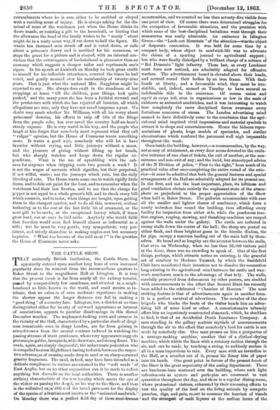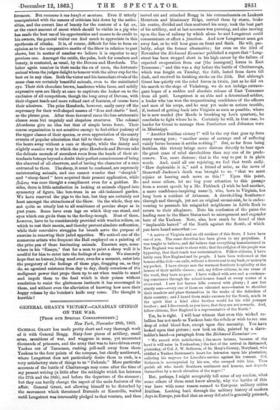THE CATTLE SHOW.
fr HAT eminently British institution, the Cattle Show, has
apparently entered upon another long lease of even increased popularity since its removal from the incommodious quarters in Baker Street to the magnificent Hall at Islington. It is true that the peesent locale is far from nearly all the railway termini, passed by comparatively few omnibuses, and situated in a neigh- bourhood so little known to the world, and amid streets so in- tricate, that no cabm in of even moderate experience in making the shorter appear the longer distance dun fail in making a "good thing" of a country fare. Islington, too, a district at no time distinguished either for beauty of outward appearance or interest of associations, appears to peculiar disadvantage in this dismal December weather. The unpleasant-looking rows and terraces in the vicinity of the Hall, characterized by a particular shade of dingi- ness remarkable even in dingy London, are far from gaining in attractiveness from the mental contrast induced in watching the passing streams of stout gentlemen, whose very appearance suggests picturesque gables, farmyards,wide doorways, and strong floors. The roads, again, are simply disgracefu], the unfortunate pedestrian who is compelled to gross High Street having todecidebetween the respec- tive advantages of crossing ancle-deep in mud or on sharp-cornered granity fragments. The mud, indeed, may have been intended as a delicate compliment to visitors accustomed to the "soft roads" of East Anglia, but on no other supposition can it be made to reffect anything but discredit on the local authorities. There is another striking characteristic of the new locality which meets the eye of the visitor on passing the Angel, on his way to the Show, and that is the unlimited capabilitis of the broad pavement for the display of the species of aivertisement known as the "animated sandwich." On Monday there was a perfect field -day of these semi-human monstrosities, and we counted no less than seventy-five visible from one point of view. Of course there were determined struggles for the occupation of favourable situations, and the precision with which some of the best-disciplined battalions went through their manceuvres was really admirable. An eminence in Islington Green—the "Look-out Mountain "of the situation—was the object of desperate contention. It was held for some time by a compact body, whose object in sandwich-life was to advocate the claims of a sporting journal to agricultural support ; but vtho were finally dislodged by a brilliant charge of a column of "Bel Demonio " light infantry. These last, as every Londoner must have now noticed, are admirably adapted for offensive warfare. The advertisement board is elevated above their heads, and sectued round their bodies by an iron frame. With their hands at liberty, and a favourable wind, they must be irre- sistible, and, indeed, seemed on Tuesday to have secured an indefeasible title to the eminence. Of course union and esprit de corps tell, even in organizations so low in the wale of existence as animated sandwiches, and it was interesting to watch how completely the more disciplined forces overcame every fortuitous concourse of atones. The London advertising mind seemed to have definitively come to the conclusion that the agri- cultural mind required vivid impressions and material symbols to attract it to shops and entertainments. Hence the hideous repre- sentations of ghosts, huge models of spectacles, and similar abominations which rendered the pavement well nigh impassable throughout the week.
Once inside thebuilding, however,—a consummation, by the way, not so easy of attainment, as every door seems devoted to the exclu- sive-entrance of one class of tickets, the exit of another, or the non- entrance and non-exit of any; and the lueid, but stereotyped advice of the N Division of police, "First to the right," loses much of its practical value after once completing the entire round of the cite- nor—it must be admitted that both the general features and special arrangements of the Hall are admirably adapted for its present use. In the first, and not the least important, place, its loftiness and good ventilation obviate entirely the unpleasant state of the atmos- phere so prejudicial to the proper appreciation of the Show when held in Baker Street. The galleries accommodate with ease all the smaller and lighter classes of machinery, which form a nearly unbroken line round the building, thus affording every facility for inspection from either side, while the ponderous trac- tion-engines, reaping, mowing, and theashing-machines are ranged against the walls under the gallery. The cattle are tethered in roomy stalls down the centre of the hall; the sheep are posted on either flank, and those brightest gems in the bacolic diadem, the fat pigs, occupy a sanctum leading out of the main hall by them- selves. So broad and so lengthy are the avenftes between the stalls, that even on Wednesday, when no less than 86,000 visitors paid at the doors, there was no crowding to speak of. One of the first things, perhaps, which attracts notice on entering, is the graceful act of courtesy to Madame Tussaud, by which the Smithfield Club have manifested their intention not to dissolve the connection long existing in the agricultural mind between fat cattle and wax- work murderers, much to the advantage of that lady. The walls, carefully preserved from defacement by other posters, are studded with announcements to the effect that Samuel Hunt has recently been added to the celebrated "Chamber of Horrors." The next striking feature is that of advertisements again in another form. It is a perfect carnival of advertisers. The member of the shoe brigade who blacks the boots of the visitor hands him an adver- tising bill of some kind or other. A commissionaire urbanely offers him an ingeniously constructed almanack, which, he shudders to find, is that of an Accidental Death Insurance Company. A man standing in the gallery scatters myriads of announcements through the air to the effect that somebody's food for cattle is not made by somebody else. One man presses on him a prospectus of a sausage-making machine, another that of a clothes'-drying machine, which whirls the linen with a rotatory motion through the air, and can be made, by touching a string, to suddenly enclose it all in a mass impervious to rain. Every man with an invention in the Hall, or a crotchet out of it, presses his flimsy bits of paper into his hands. One great point in favour of the present locale of the Show is the great superiority of the eating department. There are luncheon-bars scattered over the building, where such light refreshments as oysters and pork-pies are consumed in vast quantities throughout the day, and there is a regular dining-room, where professional visitors, exhausted by their unceasing efforts to test the quality of the beef on the living animals by energetic punches, digs, and pats, resort to consume the heaviest of viands and the strongest of malt liquors- at the earliest hours of the



































 Previous page
Previous page